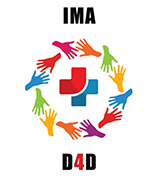Doctors, especially those working at the frontline with COVID-19 suspected patients, need assistance to safeguard and improve their emotional well-being. Here are some pointers to help them Thrive:
Your anxiety as a professional and getting help
• Anxiety and uncertainty are normal during times like this and are universal.
• To some extent this anxiety can even be helpful and will keep you alert to take necessary protective precautions.
• As professionals there will be an inevitable risk of getting infected when working in close proximity with COVID positive patients, but with the right precautions, it is preventable.
• Remember that you are a precious and limited resource. Make sure you use the personal protective equipment correctly. Put on your own mask first.
• Approach the staff clinic or the Department of general medicine in your hospital in case of any symptoms. There’s always a team of great doctors and health care professionals around you, who will do everything possible to get you better.
• It is also important that you don’t’ self-medicate If you are experiencing any symptoms.
• Being objective becomes difficult once the roles of a doctor and patient merge. The resulting subjectivity can put you, your family members and patients at risk.
• Remember that this crisis too shall pass.
Dealing with increased workload
• Do not see yourself as the only person expected to solve all the problems around. Don’t hesitate to ask for help when needed.
• Handling Anxious patients and caregivers: This is not uncommon especially where most patients and even caregivers are worried about having the disease. Literate patients can be pointed to posters and information leaflets as well as official online forums while more time should be spent on individuals who cannot read.
• Reassure them that everything is being done according to protocol, but at the same time, avoid making sweeping statements such as “there is nothing to worry”. It’s easy to make such statements but it puts more pressure on you.
• Yoga, prayer and meditation are going to be relaxing and can help reduce anxiety.
• You need to be your own first priority. Know your limits-If you’re feeling unwell and feel like taking a few hours off, inform the senior team member and take rest. You need to keep yourself going to help others
• Remember everybody is on the edge and we must believe that everyone is doing the best they can.
• If a patient is agitated or the questions are difficult to answer, request them to speak to your seniors.
• See this as a once in a generation occurrence that helps you get used to crisis situations. As you finish the work for the day tell yourself that years from now you will look back with pride and satisfaction on your work today regardless of what challenges encountered on the day.
Self-care and meeting your basic needs
• Ensure you get adequate rest and respite despite the increased workload and shifts.
• Get enough sleep, keep yourself hydrated. Eat healthy food. Try to eat home cooked food as much as possible. Have an exercise routine and keep yourself physically active
• Doing this will help you concentrate at work and will minimize mistakes.
• Yoga, prayer and meditation are going to be relaxing and can help reduce anxiety.
• You need to be your own first priority. Know your limits-If you’re feeling unwell and feel like taking a few hours off, inform the senior team member and take rest. You need to keep yourself going to help others
Looking after your colleagues
• It is important that seniors give a pep talk to team members at the beginning of the duty praising them for their good work. This can make a big difference to team morale.
• Make sure you are not displacing your frustration and anger at your peers or juniors or patients and caregivers.
• Remember everybody is on the edge and we must believe that everyone is doing the best they can.
Staying connected
• It is important to remember that social distancing does not mean social isolation.
• Make it a point to talk to your family regularly, while walking from your vehicle to the hospital building, for example! They would also be concerned for your safety, and would need reassurance too. Put yourself in their shoes.
• Don’t allow for news associated with coronavirus to dominate every conversation you have with your family and friends.
• Use the time off to share stories, to focus on all the other things going on in your lives and to have regular conversations
• Important to stay informed but don’t obsessively check for updates. Do it at fixed times twice a day.
• If you begin to feel overwhelmed, stay away from the media completely and ask someone reliable to share the most important updates with you.
Resources doctors could use
- The WHO forum
- CDC-Centers for Disease Control and prevention
- The National Institute of Mental Health
- The Indian Medical Association portal
- Ministry of Health and Family welfare
This article first appeared in the IMA doctors4doctors March 2020 news bulletin and has been republished with permission.


